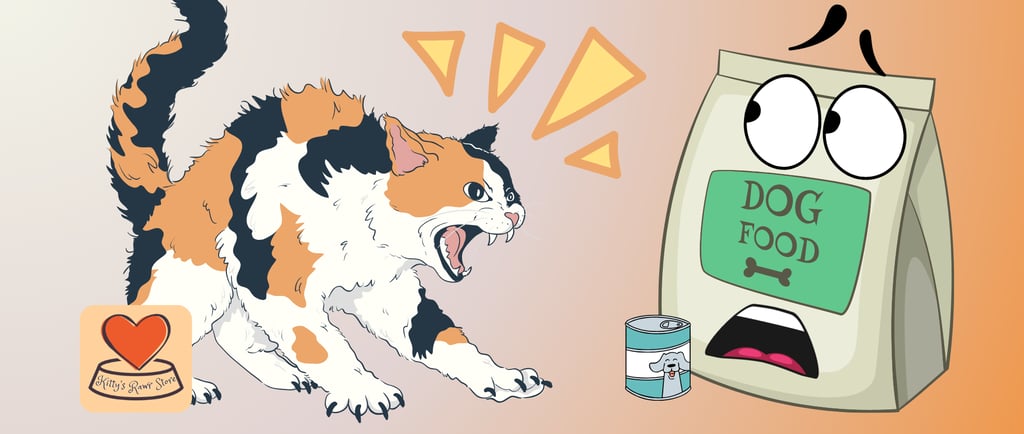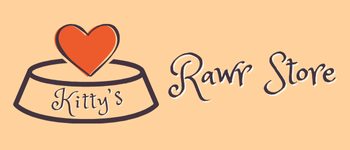Can Cats Eat Dog Food?
An explanation as to why you shouldn't feed your cat dog food.


Unfortunately, I hear this question ALOT. People assume raw food is the same thing across the animal types - Wrong! Here are some of the reasons why.
Just like human food food, raw pet food has recipes and is tailor made to cater to the specific needs of its intended consumer. The market for raw dog food is vast and readily available, unsuspecting cat owners wanting to try raw can often be mislead into believing raw dog food is 'also suitable for cats.' But this is not always the case. If you are new to raw feeding, I strongly suggest going for species appropriate food, which means, if you have a cat, find cat food, if you have a dog, find dog food.
I know it sounds simple enough but people still get it wrong.
Just a quick note; When I refer to raw pet food in this article, I am talking about raw foods made to recipes for pets (usually in minced form) not treats such as duck wings, chicken necks, fish skins etc. These 'treats' are not what I'm talking about, this article is just focusing on raw foods manufactured and designed to be used as your pets main daily diet.
Here in the UK there are a few trade associations that represent or govern companies involved in feeding pets. You have the FEDIAF (European Pet Food Industry Federation) which is the trade body that represents 18 countries and approximately 95% of the pet food market. UK Pet Foods (formally PFMA) which represents both pet food manufacturers and suppliers, speaking on their behalf to the government, the media and other stakeholders. Defra (Department for Environment Food and Rural Affairs) which is responsible for environmental protection, food production and standards, agriculture, fisheries and rural communities. These are few big ones, but there are more, the point here is that a good pet food manufacturer should be affiliated with one of more of these industry standard companies to show that their products are made to the standards that pets require.
These companies have strict legislations about nutritional needs, labelling guidelines, good and safe practices, processing systems, composition etc. They have these guidelines in place for manufacturers to adhere too and to be able to provide something that is species appropriate and clearly advertised and explained to the end consumer.
These guidelines are extensive and I will not go into the whole 98 pages of basic dog and cat nutritional needs set out by the FEDIAF! But to summarise what the guide highlights;
Dog and cat nutritional needs are very different, so if a manufacturer makes and sells 'Raw Dog Food' it has been made to meet the requirements of a canine, not feline. It really is as simple as that.
To show a few simplified examples as to the nutritional requirements set out by FEDIAF:
Biotin (Vit B7):
Dog - No Minimum requirement
Cat - Minimum 0.006mg per 100g
Protein
Dog - Minimum 18g per 100g
Cat - Minimum 25g per 100g
Niacin (Vit B3)
Dog - Minimum 1.64mg per 100g
Cat - Minimum 3.20mg per 100g
Iron
Dog - Minimum 3.6mg per 100g
Cat - Minimum 8mg per 100g
Taurine (Amino Acid)
Dog - Not even listed as a requirement
Cat - Minimum 0.20g per 100g (canned cooked wet food)
In conclusion, you can see the nutritional needs according to the people who are making our pets' food can be hugely different. It may look the same but what suits a dog doesn't suit a cat and vice versa. Buy cat food for you cat - simple. Leave the dog food to the canines!
Need further advice?
Try our Advice Page for quick hints to help your furry feline. Or drop us a question via our contact form on the 'Contact Us' page and we will try our best to get you answers.


